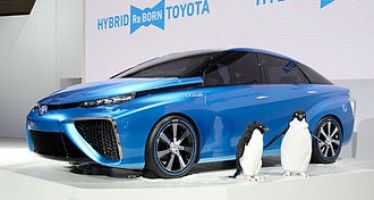CA green jobs program disappoints
 Three years after California voters passed the Clean Energy Jobs Act, the tally for “green” jobs created by the measure has fallen far short of expectations, touching off another round of controversy about the costs and consequences of the Golden State’s environmental policies.
Three years after California voters passed the Clean Energy Jobs Act, the tally for “green” jobs created by the measure has fallen far short of expectations, touching off another round of controversy about the costs and consequences of the Golden State’s environmental policies.
Disappointing numbers
Voted in as Proposition 39, the act “raised taxes on corporations to fund energy-efficiency construction projects,” as the Hill recalled. Lawmakers directed half of the revenue toward clean energy efforts at California schools. But an Associated Press report revealed that “money is trickling in at a slower-than-anticipated rate, and more than half of the $297 million given to schools so far has gone to consultants and energy auditors.” Meanwhile, the jobs numbers amounted to almost 10 percent of what voters were led to expect.
Asked by the Los Angeles Times why Prop. 39 boasted 1,700 jobs instead of the 11,000 that had been promised when voters passed the measure, state Senate leader Kevin de Leon, D-Los Angeles, asked for patience. “We are taking our time because I think we want to do things right,” de Leon said.
The oversight board also created by the measure, the Times observed, still has not met. According to the Orange County Register, the board includes nine members drawn from the fields of academia, engineering and climate science.
In a statement issued by de Leon and Tom Steyer, the environmentalist billionaire who fueled the Prop. 39 campaign, the two Democrats suggested that schools simply needed more time. “Most school districts are either in the planning phase or are preparing to launch large-scale, intensive retrofit projects that will maximize benefits to students, school sites and the California economy,” they argued, according to the AP.
A backlog of projects
Regulators at the State Energy Commission made an effort to back up de Leon’s and Steyer’s claims, the AP added, estimating some $25 million a year in the pipeline despite a lax reporting requirement that leaves the state in the dark until as many as 15 months after school projects are finished.
According to Pete Miller at the Natural Resources Defense Council, which supports Prop. 39, the Energy Commission has approved 253 plans affecting 788 schools, to the tune of some $170 million.
“The eligible projects include repairs to heating, ventilation and air-conditioning systems; new chillers, boilers and furnaces; new lighting and lighting control systems; installation of energy-efficient windows, shades and programmable thermostats; and onsite clean energy generation.”
The expectations game
But some Democrats have joined California Republicans in calling for new oversight over the program. Assemblyman Henry Perea, D-Fresno, raised the prospect of hearings, while Senate Minority Leader Bob Huff, R-San Dimas, demanded they be scheduled immediately.
Because the act was passed as a proposition, even supportive legislators found themselves having to speak to voters’ expectations, which were inflated by Prop. 39’s biggest boosters over the course of the campaign. Steyer, for instance, “repeatedly said the measure would generate $1 billion annually, half of which, $500 million, would be earmarked for energy efficiency in each of the first five years after its passage,” according to the Sacramento Bee editorial board.
And the State Energy Commission has taken its share of criticism for a tone-deaf reaction to the sense of betrayal. Spokesman Albert Lundeen refused to supply the San Francisco Chronicle with a date when the oversight board would meet. “We would agree that it’s an important part of the program and they will be meeting sometime in the future,” he told the paper. (The timing is likely to result in a September or October meeting, according to the Orange County Register.)
“The Legislature needs to lean on this board by demanding its annual reports,” the Chronicle’s editorial board concluded. “An accountability board that doesn’t meet is more than just an oversight — it’s bad governance.”
Related Articles
Sanders/Clinton split could sting CA Dems
California Democrats divided amidst their own dominance — along lines of class, geography and spending policy — can add another
Elections offer lessons for California GOP
This post has been updated below. Yesterday, two states located thousands of miles from California elected new governors. And
Feds funnel money to CA hydrogen cars
The hype surrounding electric cars is running out of gas — and the Department of Energy is directing funds toward hydrogen.




